October 16, 2024
When: October 17th @ 11am
Where: TMCB 1170
Talk Title: Towards Interactive, Robust, and Aligned AI Systems
We are in an age of “AI everywhere, all at once.” As AI systems become more prevalent in daily life it is increasingly important that their behavior is aligned with human intent and that these AI systems do what we actually want them to do, despite the fact that human intent is often nuanced and hard to formally specify. In this talk I will discuss recent progress towards using human input to enable interactive, robust, and aligned AI systems with a focus on three main topics: (1) how to enable AI systems to estimate human intent, (2) how to make AI systems that are calibrated and robust to uncertainty over human intent, and (3) how robots and other AI systems can efficiently query for additional human input to actively reduce uncertainty and improve their performance.
October 03, 2024

When: October 10th @ 11am
Where: TMCB 1170
Talk Title: Finding the Courage to Build a Better World
Travis E. Oliphant (BS ’95, MS ’96) is a luminary in the Python and AI communities. He started the SciPy project in 1999 as a student at the Mayo Clinic and built NumPy in 2005 while a professor in Electrical and Computer Engineering at BYU. These libraries have been adopted throughout the scientific and business world. His work enabled Python to become the number one computer language in the world and the foundation for modern AI.
September 26, 2024
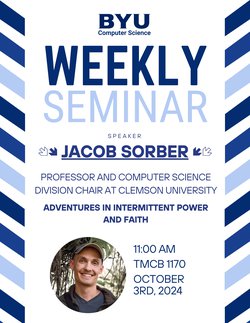
When: October 3rd @ 11am
Where: TMCB 1170
Talk Title: Adventures in intermittent power and faith
"The Internet of Things has a battery problem. We simply can’t afford to recharge, replace, and dispose of trillions of batteries. Batteryless computing offers hope of a more sustainable future with devices that can be deployed maintenance-free for decades, but they are difficult to design, program, test, and deploy, due to frequent and unpredictable power failures. This talk will explore lessons learned from two decades of research on intermittently-powered systems and the transformative power of uncertainty and hope in the journeys of disciples and scholars."
September 19, 2024
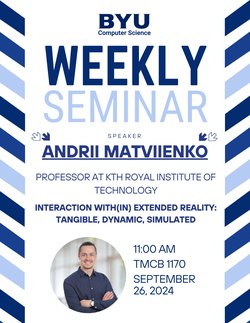
When: September 26th @ 11am
Where: TMCB 1170
Talk Title: Interaction with(in) Extended Reality: Tangible, Dynamic, Simulated
Extended Reality (XR), which is an umbrella term for Augmented Reality (AR), Virtual Reality (VR), and Mixed Reality (MR), is poised to introduce new ways of interacting with people, education, entertainment, and training by employing new technological solutions. While many applications are focused on individual, indoor, and visual-auditory interactions for work and home entertainment, interactions outside living rooms, multimodal aspects, and simulations have a long way to go. In this talk, I will focus on three main aspects of interacting with and within XR: (1) tangible, (2) dynamic, and (3) simulated. I will present works that enable haptic feedback, ranging from facilitating a feeling of being touched, drawing in VR, and crafting for children; interaction with XR while moving, e.g., in cars, bicycles, e-scooters, and walking, and when interacting with participants in XR spaces; and lastly, I will talk about simulated environments and how to increase their realism and thus ecological validity of controlled experiments.
September 18, 2024
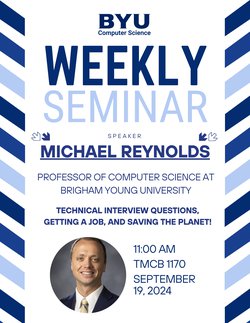
When: September 19th @ 11am
Where: TMCB 1170
Talk Title: Technical interview questions, getting a job, and saving the planet!
We will do some practical training on algorithms and explore space and runtime efficiency. We'll briefly explore what to do to get a job including some resume tips and people tips. Finally, if none of that was interesting to you please come and learn how to write efficient code to reduce your code's impact on the environment! These may all seem unrelated, but come find out why they are one and the same.
September 09, 2024
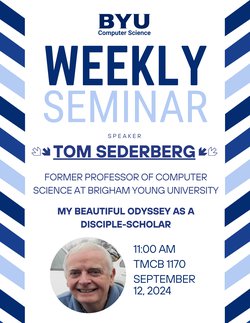
When: September 12th @ 11am
Where: TMCB 1170
Talk Title: My Beautiful Odyssey as a Disciple-Scholar
This talk presents some of what I have learned about being a disciple-scholar during my years at BYU, first as a student and later as a professor.
August 12, 2024
July Alumni Spotlight
"Involve God at every step. Find mentors who believe in you even when you don’t believe in yourself. And it’s ok to want to quit a million times!" Alicia Wood
June 27, 2024
“It was still stressful, but it was also an amazing experience to be with the whole organization and to all be working together toward the common goal. And amazing to watch some of the best players in the world making plays all over the field.”
BYU Student Awarded 2023 World Series Ring
April 18, 2024

Tyler Stahle from BYU Communications reports, "This year’s animated short story was The Witch’s Cat, a heartwarming tale of a witch’s feline that grows jealous of the attention the witch is giving to her new boyfriend. The cat’s attempts to thwart the relationship leaves viewers laughing while anxiously waiting to see what happens next. The film was directed by BYU animation student Abby Staker and produced by Jessica Fink Blaine."
The Witch's Cat wins Student Emmy for BYU Animation this April, 2024.
April 08, 2024
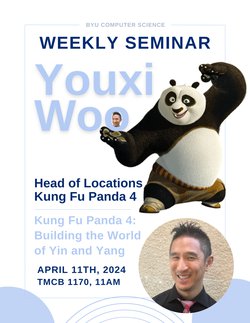
When: April 11th @ 11am
Where: TMCB 1170
Talk Title: Kung Fu Panda 4: Building the World of Yin and Yang
As we enter the fourth installment in the Kung Fu Panda franchise, Po is faced with a new challenge of growth, his promotion to the spiritual leader of the Valley of Peace. We accompany Po as he visits both familiar and new locales where he meets new friends and a dangerous villain. But in order to become the spiritual leader, he must understand what it means to have the balance of Yin and Yang. This seminar will explore how the filmmakers kept balance at the forefront of their design and technology decisions; landscape and architecture reflecting opposite emotions, the use of real time game engines to build out and discover new worlds, the innovative new FX techniques for transforming animated characters, the various threads of the story - good vs evil, familiar vs new, heart vs action.
April 02, 2024
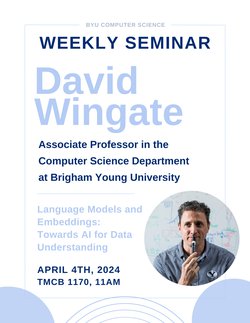
When: April 4th, 2024
Where: TMCB 1170
Talk Title: Language Models and Embeddings: Towards AI for Data Understanding
New tools of artificial intelligence and machine learning allow data scientists to move beyond charts and graphs when trying to harvest insight from data. In this talk, I will discuss how language models like ChatGPT can be used as a serious tool for data analysis, allowing researchers and scientists to perform a variety of analysis on unstructured text. Language models can also be combined with embeddings to provide powerful new ways of thinking about how to cluster and abstract data. Throughout the talk, I will discuss these tools in the context of my current research, involving applications in psychology and political science.
March 28, 2024
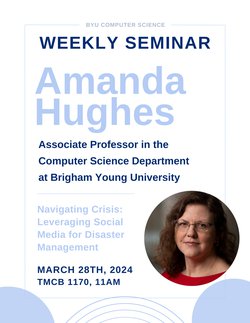
Where: TMCB 1170
When: March 28th @11am
Talk Title: Navigating Crisis: Leveraging Social Media for Disaster Management
The ubiquity of social media platforms has revolutionized the way information is disseminated during crises. From natural disasters to public health emergencies, individuals turn to platforms like Twitter (now X), Facebook, Reddit, Instagram, and others to share real-time updates, seek assistance, and provide situational awareness. This flood of user-generated content presents both opportunities and challenges for emergency management. This presentation draws upon a blend of case studies and empirical research, including insights gleaned from my own work, to explore ways in which social media data analytics, geospatial mapping, natural language processing, and machine learning techniques can be leveraged to extract actionable insights from the vast volume of online information. Furthermore, I will discuss recent research aimed at mitigating challenges related to misinformation, aggregating data from multimodal sources, and enhancing machine classifier training through sustainable context-sensitive labeling methods in the disaster setting. Through interdisciplinary collaboration and innovative socio-technological solutions, I will demonstrate how we can harness the power of digital platforms to save lives, mitigate suffering, and foster disaster resilience in an increasingly interconnected world.
March 08, 2024

Where: TMCB 1170
When: February 29th @11am
Talk Title: Multi-fidelity Learning and Active Learning for Scientific Machine Learning
Abstract: Multi-fidelity learning involves using training examples at different fidelities or resolutions. High-fidelity examples are of high-quality but often are much more costly to collect than inaccurate, low-fidelity examples. How to retrieve and leverage examples at multiple fidelities is the key to reduce the learning cost while maximizing the efficiency. This talk will introduce our recent work in multi-fidelity learning and active learning for scientific machine learning. Physical simulation is a central task in science and engineering domains. However, traditional numerical methods are known to be computationally costly and lack generalizability across different problems. Learning data-driven surrogate models presents a promising strategy for cost reduction. I will discuss three multi-fidelity, multi-resolution active learning approaches designed to dynamically acquire simulation examples and their fidelities, enhancing surrogate learning performance while minimizing data acquisition costs. I will demonstrate the efficacy of these methods through applications in standard benchmarks of physical simulation and topology structure optimization. Furthermore, I will introduce an infinite fidelity surrogate learning framework, which extends the traditional finite fidelity space to an infinite continuous space. This framework offers exciting possibilities for advancing scientific machine learning by enabling more comprehensive representations of complex systems and phenomena.
February 22, 2024

Where: TMCB 1170
When: February 29th @11am
Talk title: Ultra-Scale Intelligent Systems: A New BYU Research Area Investigating Intelligence at Scale
After seeing so much progress in AI over the last few years, it’s hard to understand why many enterprises still struggle to bring AI models into production. This research investigates the fundamental drivers of AI system development to identify roadblocks and potential solutions. To address these issues, the relatively new field of Machine Learning Operations, or MLOps, seeks to improve AI development across the entire lifecycle. These improvements promise a shorter time to market, lower costs, and higher value. Leveraging enhanced AI development processes, we explore the possibilities of scaling AI systems to support millions of models in production. At this scale, typical model metrics are no longer sufficient, and new analysis methods are needed. We present a framework for characterizing Ultra-Scale systems and discuss potential approaches for research and analysis. These Ultra-Scale systems could enable novel applications across diverse areas such as manufacturing, demand forecasting, social networks, IoT systems, traffic management, and swarm intelligence.
February 13, 2024
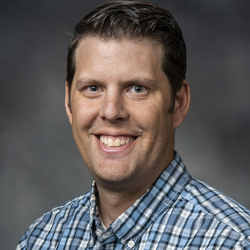
Where: TMCB 1170
When: February 15th @11am
Talk title: Bayesian Skill Estimation: Methods and Applications
Abstract: Actions in many real-world domains cannot be executed exactly. An agent’s performance in these domains is influenced by two critical factors: the ability to select effective actions (decision-making skill), and how precisely they can execute those selected actions (execution skill). For an AI to make effective action recommendations to a person, knowledge of their execution skill is required. This talk addresses the problem of estimating both the execution and decision-making skill of an agent, given observations. Several execution skill estimation methods will be presented, each of which utilize different information from the observations and make assumptions about the agent’s decision-making ability. A final novel method forgoes these assumptions about decision-making and instead estimates the execution and decision-making skills simultaneously under a single Bayesian framework. Experimental results in several domains evaluate the estimation accuracy of the estimators, especially focusing on how robust they are as agents and their decision-making methods are varied. These results demonstrate that reasoning about both types of skill together significantly improves the robustness and accuracy of execution skill estimation. A case study using the proposed methods to estimate the skill of Major League Baseball pitchers is presented, along with a complete AI system that utilizes this estimate to provide pitch recommendations. This case study demonstrates how these skill estimation methods can be applied to real-world data sources and provide effective action recommendations to humans.
February 05, 2024

Where: TMCB 1170
When: February 8th @ 11am
Talk title: Grand Challenges in HCI for Sports and Recreation
Abstract: Interactive computational devices, such as smartphones, motion trackers, and smartwatches, are integral to many human activities, including amateur sports and outdoor recreation. Sports and recreation are critical components of human wellness. However, the relationship between interactive computing and the wellness benefits of sports and recreation is not well understood. In this talk, I will present both research results and grand challenges related to the use of interactive computing in sports and recreation. Research results include an interview study on the use of motion data for figure skating coaching and a survey study on the use and non-use of headphones during hiking. Grand challenges involve understanding the athlete as a multi-faceted individual and designing for engagement in nature recreation.
January 26, 2024

Where: TMCB 1170
When: February 1st @ 11am
Talk title: Generative AI Programming Assistant
Abstract: Many are asking will Generative AI and Large Language Models (LLMs) put programmers out of business? Will it displace my research and make it irrelevant? This talk provides a fresh perspective on how Generative AI is helping with the 9 hardest things programmers have to do, and our crucial role as computing researchers in this new era. We first present upcoming services in leading IDEs that enable developers to use Generative AI to (i) explain code, bug fixes, summarize recent changes, (ii) generate documentation, commit messages, name suggestions, etc. A top concern remains the trustworthiness of the solutions provided by Generative AI. While many solutions resemble the ones produced by expert developers, LLMs are known to produce hallucinations, i.e., solutions that seem plausible at first, but are deeply flawed. To help software developers trust LLM solutions, we developed novel research that synergistically combines the creative potential of LLMs with the safety of static and dynamic analysis from program transformation systems. Our current results show that our approach is effective: it safely automates code changes and is 14x more effective than previous state of the art that relies solely on static analysis. Moreover, our approach produces results that expert developers trust: we submitted patches generated by our LLM-powered tools to famous open-source projects whose developers accepted most of our contributions. This shows the usefulness of our novel approach and ushers us into a new era when LLMs become effective AI assistants for developers. We hope to inspire you with ideas on how LLMs can help you and your research go even further.
January 23, 2024
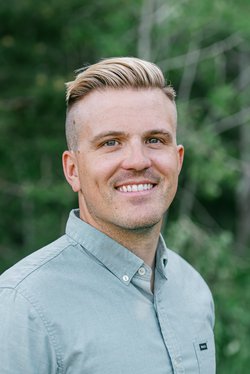
Where: TMCB 1170
When: January 25th @ 11AM
Talk title: AI in the Real World
Abstract: AI in the digital domain (i.e, text and images) is progressing at a dizzying pace, in large part due to an abundance of data and an increasing reliance on a larger compute budget. However, AI in the physical domain significantly lags behind. In fields such as engineering, healthcare, robotics, or economics data tends to be scarce, difficult to label, or challenging to aggregate due to privacy concerns. Moreover, while digital AI systems can make mistakes without real-world consequences, an error made by a physical AI system can cause harm, death, or financial loss. In this talk, I discuss strategies for improving the performance and robustness of physical AI systems. I present techniques for solving difficult physical perceptual tasks, ideas for addressing the small data problem, and methods for constructing agents that can perform reliably when the cost of an error is high. Additionally, I discuss successful deployments of these systems across a variety of fields, and present ideas to make physical AI systems more robust in the future.
January 17, 2024
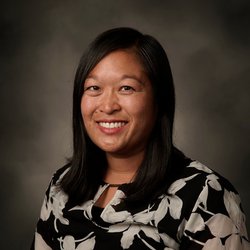
Where: TMCB 1170
When: January 18th @ 11AM
Title: Technology and Accounting for Vulnerable Populations
Abstract: This talk explores classes of individuals who are commonly vulnerable in context of technology use. I will discuss unique considerations that technologists must take into account in order to avoid inadvertently introducing harm to already vulnerable populations. Beyond avoiding harm, I will also discuss opportunities to do good and lift these individuals through technology design. I will also touch on common biases in reporting and analysis, best practices for studying these populations, and explore how to design technologies to be inclusive.
December 04, 2023

Talk title: Advancements in Sequence Alignment for CRISPR, Single-Cell Disease Simulation, and Beyond
Where: TMCB 1170 @ 11am
Application of computer science algorithms to the life sciences can substantially improve analysis and interpretation of biological data. This talk explores improvements in sequence alignment algorithms applied to the analysis of CRISPR genome editing—a cutting-edge DNA-editing technology that was recently approved in the UK as a permanent treatment for sickle cell disease. By modifying sequence alignment algorithms to reflect the biological mechanisms of CRISPR systems, we improved accuracy in identifying DNA sequence changes arising from CRISPR genome editing. These improvements are implemented in the software CRISPResso2, a widely-used tool for analysis of genome editing. We have also developed methods to analyze DNA sequences from single cells, and have used these tools to model disease initiation by introducing specific mutations into healthy cells. This talk will demonstrate how sequence alignment algorithms can be applied to cutting-edge biological technologies to improve analysis and interpretation, and ultimately affect human health.
November 10, 2023

Talk title: How Profilers Can Help Navigate Type Migration
Sound gradual types strengthen code with formal guarantees, but may require expensive run-time checks depending on how typed and untyped code interact. In this paper, we explore profile-guided strategies to discover gradual codebases that run as quickly as untyped code. One strategy rises to the top, but it succeeds in only 50% of all trials. Going forward, we need better profilers to measure type costs. Our experiment was made possible by the Rational Programmer method for automatically testing hypotheses about human programmers.
November 07, 2023
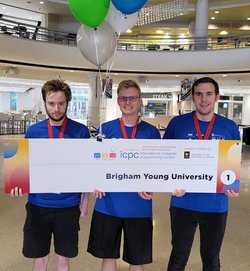
Brigham Young University, now a leading force in competitive programming, is thrilled to announce that our talented programming team has received a prestigious invitation to participate in the International Collegiate Programming Contest (ICPC) World Finals. This will mark the university’s third appearance at the World Finals, and the first in more than 20 years.
The ICPC World Finals are scheduled to take place in Luxor, Egypt on April 18, 2024.
November 02, 2023
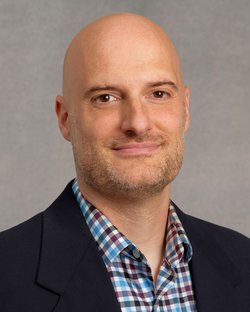
Speaker: Paul Merrell
Where: TMCB 1170, 11am
Talk title: Procedural Modeling Using Graph Grammars
Details on this weeks Graduate Seminar Series:
September 25, 2023
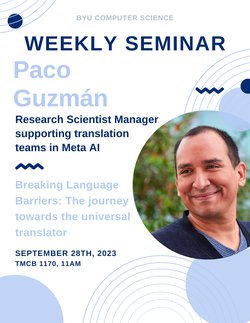
Paco is Research Scientist Manager supporting translation teams in Meta AI (FAIR). He works in the field of machine translation with the aim to break language barriers. He joined Meta in 2016 and has co-led several initiatives (e.g. SeamlessM4T, NLLB , FLORES). His research has been published in top-tier NLP venues like ACL, EMNLP. He was the co-chair of the Research director at AMTA (2020-2022) and Ethics co-chair at EMNLP 2023. He has organized several research competitions focused on low-resource translation and data filtering. Paco obtained his PhD from the ITESM in Mexico, was a visiting scholar at the LTI-CMU from 2008-2009 and participated in DARPA’s GALE evaluation program. Paco was a post-doc and scientist at Qatar Computing Research Institute in Qatar in 2012-2016
June 10, 2023
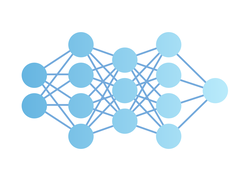
Starting Fall 2023
Intro to neural networks, decision trees, and more - with real life applications!
June 10, 2023
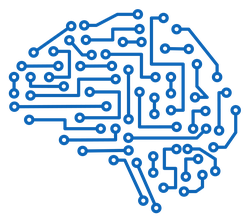
Starting Fall 2023
The Computer Science department will be offering a new B.S. degree in Machine Learning starting in Fall 2023. This degree is based on the previous emphasis in Data Science, but now has a stronger focus on machine learning.
May 09, 2023
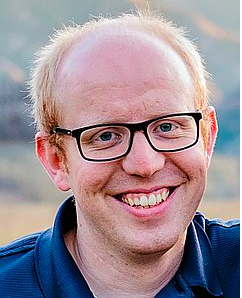
Tuesday, May 16 at 3:30 pm, TMCB 3350
Advisor: Bryan Morse
Convolutional Networks - Bridging the gap between standard and specialized
April 14, 2023
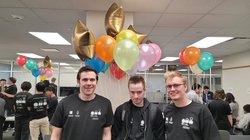
42 teams across 10 schools with BYU hosting. The Rocky Mountain Regional Programming Contest tested our regions brightest minds with challenging coding problems. Our very own BYU students won 1st and 2nd place--taking most of the podium. BYU's team rankings are listed below.
1st: BYU TTL 255 - Teikn Smith, Lawry Sorenson, Thomas Draper
2nd: BYU GPT - Jason Oliphant, John Swingle, Paul Swingle
9th: BYU O=('-'Q) - Josh Taylor, Hannah Atanasio, Kevin Kinney
15th: BYU blobs - Isaac Criddle, BJ Foutz, Jared Black
17th: BYU; DROP TABLE users; - Yirang Lim, Sterling Larson, Daniel Taylor
21st: BYU Greedy BFFs - Joseph Scholl, Zach Hacking, Brenden Smith
26th: BYU The Immutables - Ethan Kerr, Nelson Schnepf, Harrison Winslow
Join us in congratulating these amazing students!
March 22, 2023
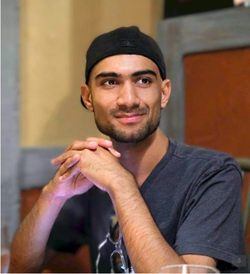
April 5th, 2023, 3350 TMCB 11:00am
Advisor: Michael Goodrich
PhD Dissertation Defense for Aadesh Neupane
December 02, 2022
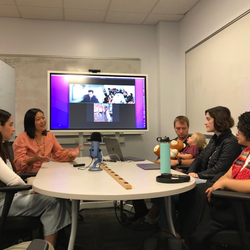
Dr. Xinru Page is a member of the Computer Science faculty and has been here at BYU for the last three years. Prior to joining the university, she taught at Bentley University. Dr. Page holds a Ph.D. in Information and Computer Science with a concentration in Informatics from the University of California, Irvine, and B.S. and M.S. degrees in Computer Science with a specialization in Human-Computer Interaction from Stanford University. She directs the Social Technology and Privacy Lab on campus which conducts research on human computer interaction.
Dr. Page has several students who work as researchers in the lab, and they are on various teams that do research in the realm of social technology and privacy. Some of those teams include Human-Algorithm Interaction, Technology Adoption and Nonuse, and Understanding Individual, Developmental, and Cultural Differences in Privacy Attitudes. Lab meetings are held every Thursday, and the teams meet together with Dr. Page to get feedback on the results of current studies, discuss issues and opportunities posed by new technologies, and even practice giving presentations. Lab meetings begin with a prayer and a spiritual thought, as is customary at BYU. Dr. Page explains that she enjoys doing this because everything is connected, both religion and research, and keeping them integrated in her life makes things "feel whole."
One main study that Dr. Page has recently published a paper on identifies the unintended negative consequences when young autistic adults interact on social media. Social media is a technology that has connected the world and provided opportunities for innovation and maintaining relationships, but for those who view and navigate the world differently, it has the potential to mislead users and lead to dangerous situations. Autism is a form of neurodiversity, and those on the Autism Spectrum have communication, social, and behavioral differences, which carry over to interactions online. There has been very little prior research on this subject.
In Dr. Page’s research, she and her team performed a lot of ethnographic fieldwork. This included interviews with autistic youth and their parents, as well as social service providers who interacted with those on the autism spectrum. They also participated in and observed workshops on social media as well as life skills in general. They focused on understanding how autistic young adults utilized the main affordances of social media, namely, sharing user-generated content, consuming user-generated content, connecting with others, and networked interactions. The research sought to understand how these autistic young adults used these affordances, what the consequences of this use were, and what could be done to redesign a more accessible system.
One observation made in her research was that a large reason for Autistic users to perceive affordances differently was the literal interpretation of the interface. This leads these users to view and share media differently. For example, some neurodivergent individuals would disclose personal information, like a phone number or email address, just because there were fields that asked for this information (even though a neurotypical interpretation would recognize these as optional fields). Another way this is harmful is when a literal interpretation is applied to prompts and labels found on social media. Facebook typically asks users to share 'what’s on their mind,' and this can lead to some oversharing feelings or publicly expressing dislike for someone or something. One staff member interviewed shared this: "They’re going onto Facebook at night and, ‘I hate my job,’ and, ‘I hate this person.’" For these neurodivergent individuals, they were doing what they thought was appropriate by following the platform's instructions. However, interpreting and following prompts literally often proved harmful to their relationships and personal safety.
One especially problematic issue was the label of ‘friend’ on social media. Rather than understanding this as a way to connect with people you already know, it was taken as an invitation to become a friend, and some of these individuals assumed a deeper relationship with this ‘friend’ than they actually had in reality. One participant shared, "I thought I was her friend, but she said, ‘You’re not because we don’t know each other well enough.’"
Dr. Page and her students have also been working to find effective ways to change the design of social media and online technologies to be more inclusive of this population. They determined that prompts and labels need to be more direct, with less ambiguity and safety in mind, and that more social guidance needs to be provided to these neurodivergent individuals. Kirsten Chapman, a student working with Dr. Page, shared that one project in this inclusive design she had worked on was adding a questionnaire to the friend request feature of social media. Questions would be asked to help neurodivergent individuals determine whether they actually knew the person and if it made sense to add them as a connection online.
Check out the News tab to see other cool stories!

